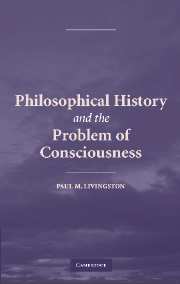Book contents
- Frontmatter
- Contents
- Preface
- Acknowledgments
- 1 Introduction: Philosophical History and the Problem of Consciousness
- 2 Structuralism and Content in the Protocol Sentence Debate
- 3 Husserl and Schlick on the Logical Form of Experience
- 4 Ryle on Sensation and the Origin of the Identity Theory
- 5 Functionalism and Logical Analysis
- 6 Consciousness, Language, and the Opening of Philosophical Critique
- Notes
- Works Cited
- Index
4 - Ryle on Sensation and the Origin of the Identity Theory
Published online by Cambridge University Press: 16 July 2009
- Frontmatter
- Contents
- Preface
- Acknowledgments
- 1 Introduction: Philosophical History and the Problem of Consciousness
- 2 Structuralism and Content in the Protocol Sentence Debate
- 3 Husserl and Schlick on the Logical Form of Experience
- 4 Ryle on Sensation and the Origin of the Identity Theory
- 5 Functionalism and Logical Analysis
- 6 Consciousness, Language, and the Opening of Philosophical Critique
- Notes
- Works Cited
- Index
Summary
By 1950, the theory and practice of linguistic analysis had grown, from its beginnings in the philosophical projects of Frege, Russell, and Wittgenstein, to a position of unquestioned dominance within the English-speaking philosophical world. The period from 1930 to 1950 witnessed a rapid growth of interest in the Vienna Circle's logical empiricism, and the emigration to the United States during this period of key members of the Circle, and others sympathetic to its project, ensured the quick inheritance and large-scale acceptance of “scientific philosophy” and the method of logical analysis in America. There, logical empiricism found common cause with native forms of pragmatism and logical inquiry, and a new generation of philosophers began to absorb the practice of logical analysis, while also subjecting it to decisive modifications. A. J. Ayer's powerful Language, Truth, and Logic, published in 1936, put the programmatic commitments of logical empiricism in a clear and canonical form, contributing greatly to the spread of logical empiricist views and methods both in Britain and in America. Meanwhile, at Cambridge and at Oxford, a somewhat distinct tradition of analysis, tracing ultimately to Russell and Moore's decisive rejection of absolute idealism at the turn of the century, was developing throughout this period. It would culminate in the analytic practice of “ordinary language” philosophers such as Austin, Ryle, and Strawson, philosophers who, while eschewing the formal and symbolic methods characteristic of the Vienna Circle and its descendents, brought the methods of linguistic analysis to a new level of insight and capability in their application of it to the various traditional problems of philosophy.
- Type
- Chapter
- Information
- Philosophical History and the Problem of Consciousness , pp. 111 - 150Publisher: Cambridge University PressPrint publication year: 2004

